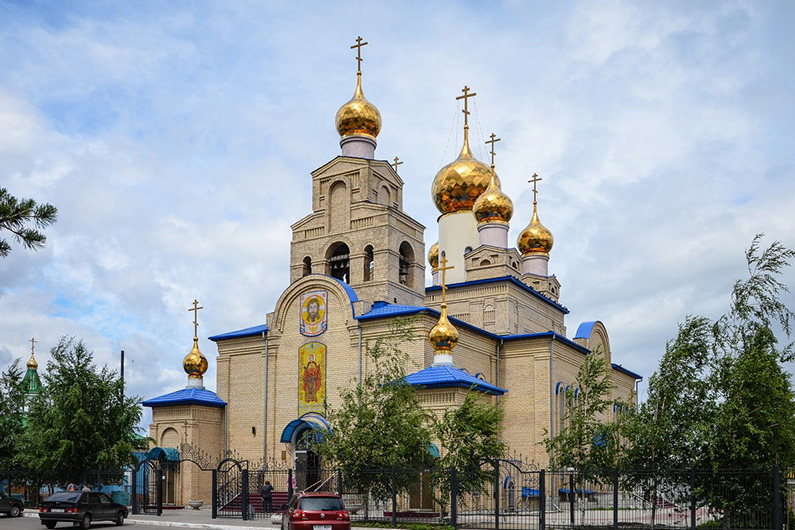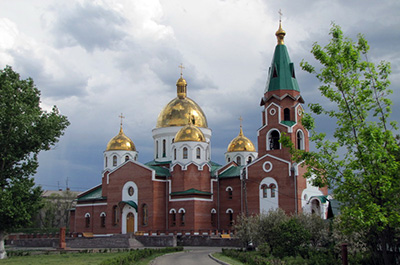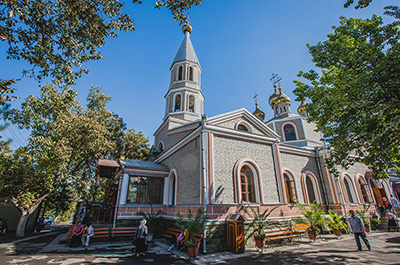
On the Feast of the Circumcision of the Lord and the day of remembrance of St. Basil the Great, Metropolitan Alexander celebrated the Liturgy in the Church of the Nativity of the Mother of God in the Akzhar microdistrict
- 14.01.2025, 12:49
- Новости на английском языке

January 14, 2025 is the Feast of the Circumcision of our Lord Jesus Christ and the day of remembrance of the great hierarch and ecumenical teacher - St. Basil the Great, Archbishop of Caesarea of Cappadocia.
Metropolitan Alexander of Astana and Kazakhstan celebrated the Divine Liturgy in the Church of the Nativity of the Most Holy Theotokos in the Akzhar microdistrict of Almaty.
The Primate of the Orthodox Church of Kazakhstan was assisted by: the dean of the parishes of Almaty, the rector of the St. Nicholas Cathedral, Archpriest Valery Zakharov; Rector of the Almaty Church in Honor of the Icon of the Mother of God "Joy of All Who Sorrow" Archpriest Evgeny Vorobyov, Secretary of the Kostanay Diocese Hieromonk Gennady (Burduzha), Rector of the Nativity of the Mother of God Church in the Akzhar microdistrict Hieromonk Alexy (Cherevtsov), Head of the Metropolitan's Personal Secretariat Hieromonk Prokhor (Endovitsky), Hieromonk Cherubim (Levin), Head of the Administrative Secretariat of the Head of the Metropolitan District Priest Georgy Sidorov; Protodeacon Nikolai Grinkevich, Protodeacon Vladimir Syrovatsky, Deacon Vladimir Alferov.
For the prayerful consolation of the faithful, a copy of the ark with the Gifts of the Magi, brought to Almaty from the Athos Monastery of St. Paul, was brought to the church for the service.
The chants were performed by a mixed choir under the direction of O. Kuznetsova.
According to the communion verse, priest Georgy Sidorov read out the Christmas message of Metropolitan Alexander of Astana and Kazakhstan.
At the end of the Liturgy, there was a glorification of the feast of the Circumcision of the Lord and Saint Basil with prayers for the beginning of the New Year and the Cappadocian hierarch.
After the proclamation of many years, the bishop addressed the congregation with an archpastoral sermon, in which he spoke about the life and works of Saint Basil the Great and revealed the spiritual meaning of the feast of the Circumcision of the Lord.
For reverent storage and prayerful worship, the Head of the Metropolitan District donated the icon of the Mother of God "Healer" to the Nativity of the Mother of God Church. Hieromonk Alexy (Cherevtsov) received the image of the Queen of Heaven from the hands of Metropolitan Alexander.
"On the eighth day after the Nativity of Christ, the Circumcision of our Lord Jesus Christ is celebrated and the great hierarch and universal teacher, Saint Basil the Great, is prayerfully glorified. Each Gospel event is called sacred because it was accomplished for the sake of sanctification and salvation of the human race. The Church commemorates these events in order to cultivate in us a desire for God, for truth and to inspire us to live a righteous life. According to the Old Testament law, our Savior accepted circumcision, established for all male infants as a sign of God's Covenant with the forefather Abraham and his descendants. During the performance of this rite, the Divine Infant was given the name Jesus, announced by the Archangel Gabriel on the day of the Annunciation to the Most Holy Virgin Mary. The name Jesus in translation means Savior. According to the interpretation of the Church Fathers, the Lord, the Creator of the Law, accepted circumcision, showing people an example of how to strictly fulfill the Divine regulations. Another important significance of the Circumcision of the Lord is that it shows everyone the truth of Christ's human nature. His flesh was real, not illusory, as some heretics taught. In the New Testament, the rite of circumcision gave way to the sacrament of Baptism, of which it was a prototype. Saint Basil the Great, Archbishop of Caesarea in Cappadocia, a great father and teacher of the Church, lived in the 4th century. In fulfilling his ministry, he zealously preached and tirelessly cared for the needs of his flock, thanks to which he earned high respect and great love from the people. In 370, Saint Basil was elected by the Council of Bishops to the Caesarea See. In difficult times for the Church, he showed himself to be an ardent defender of the Orthodox faith, protecting it from heresies with his words and letters. Basil the Great was an ascetic and man of prayer, the author of many theological works and the compiler of the rite of the Divine Liturgy, which is celebrated to this day by the Orthodox Church. For his services to the Orthodox Church, Saint Basil was called the Great and is glorified as "the glory and beauty of the Church", "the luminary and eye of the universe", "the teacher of dogmas", "the chamber of learning". He is the heavenly patron of the enlightener of Rus' - the holy equal-to-the-apostles Grand Prince Vladimir, named Basil in baptism. In one of his teachings, the saint gave us an important rule for communicating with people: "A wise man, when he eats grapes, eats the sweet berries and leaves the unripe ones. Likewise, a virtuous man, when he looks at another person, pays attention to his virtues, but a stupid and reckless person pays attention to his sins." Prayerfully celebrating the memory of Saint Basil the Great, let us imitate his holy life, his strong faith and love for God, his complete devotion to Holy Orthodoxy. Following the example of the saint, let us hasten to be true confessors of the faith of Christ, true Christians not only in name, not in words, but in life itself." From the sermon of Metropolitan Alexander.





















